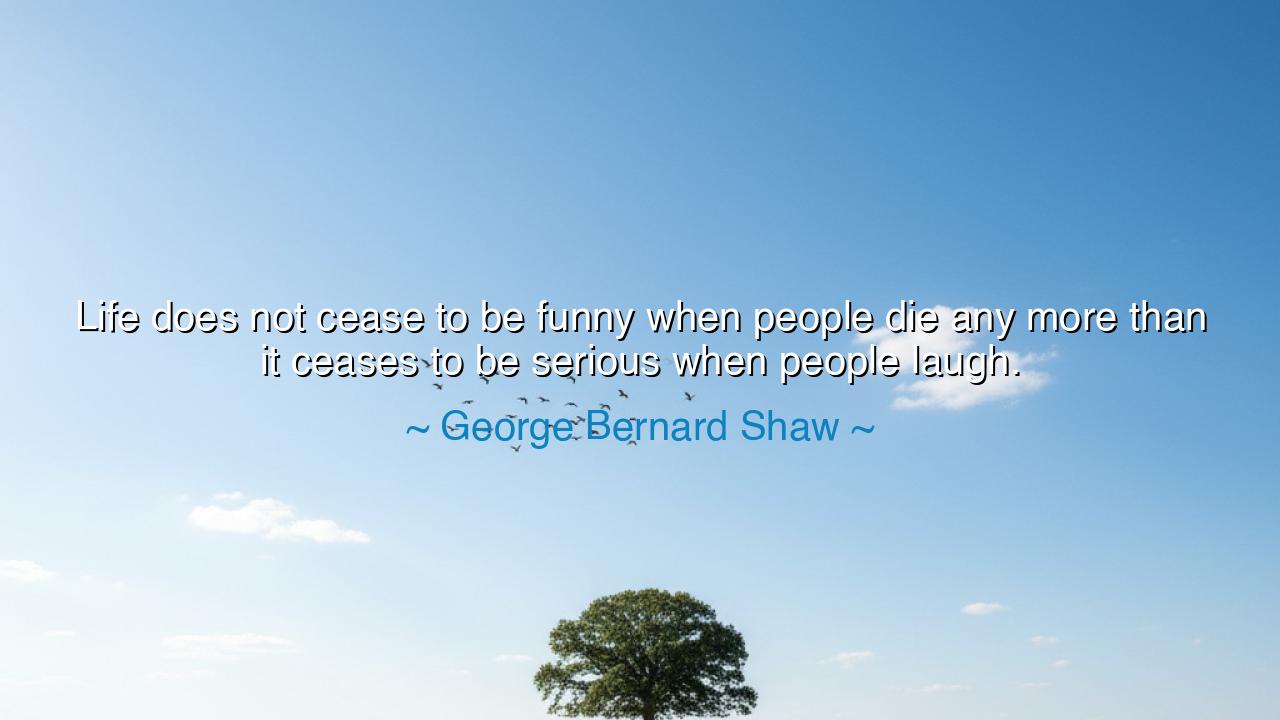
Life does not cease to be funny when people die any more than it
Life does not cease to be funny when people die any more than it ceases to be serious when people laugh.






The playwright and philosopher George Bernard Shaw once said, “Life does not cease to be funny when people die any more than it ceases to be serious when people laugh.” In this simple yet profound truth lies a paradox that only the wise can see — that life and death, laughter and sorrow, are not opposites, but companions walking the same eternal road. To those who see with shallow eyes, the world appears divided — joy opposed to grief, humor to solemnity. But to those who look deeper, as Shaw did, the two are threads of the same divine fabric, weaving together the laughter of birth and the silence of the grave.
In the style of the ancients, let us ponder this: life is both tragic and comic, and the gods themselves must have intended it so. For even in mourning, there is absurdity; even in jest, there is truth. To live fully is to embrace both — to weep without shame and to laugh without guilt. The great souls of old knew this balance. When the Stoic philosophers taught of ataraxia — tranquility of the soul — they did not mean the absence of feeling, but the acceptance of life in all its contradictions. To laugh while knowing death exists is not foolishness; it is courage. It is the act of mortals looking into the abyss and choosing to smile.
Consider the tale of Socrates, the sage of Athens. Condemned to die by his own people, he met death with laughter. As the hemlock was brought to him, he jested with his friends, asking the jailer whether he could pour a libation from the cup before drinking it. And as his body grew numb, he spoke with calm humor of how death was merely a journey — a change of dwelling. This was no mockery of death, but a recognition that seriousness and laughter coexist in the same breath of truth. In that final moment, Socrates taught what Shaw would echo centuries later: that laughter is not a denial of life’s weight, but an affirmation of its sacred mystery.
For Shaw, who lived through wars, loss, and the frailties of human folly, the comedy of existence was not a frivolous show. It was the divine irony that gives meaning to suffering. He saw that man, who dreams and fails, who loves and loses, who builds and destroys, is at once both majestic and ridiculous. Yet in that contradiction lies beauty. When a loved one dies, the world does not stop being humorous — because the humor of life is born from its impermanence. Likewise, when we laugh, the world does not lose its gravity — for behind every smile lurks the truth of mortality.
This duality is the heart of wisdom. To live as the ancients did is to walk the middle path — not fleeing sorrow, not clinging to laughter, but holding both with open hands. The samurai of Japan called this mushin, the “mind of no attachment.” They could write poems before battle, laughing at the cherry blossoms that fell as quickly as life itself. In their laughter there was not frivolity, but enlightenment. So too must we learn that laughter is sacred — not because it denies pain, but because it redeems it.
Let us remember that those who laugh amid grief do not insult the dead — they honor them. For what better tribute can be paid to a life than to remember it with joy, to smile through tears, to carry forward the warmth that once was shared? In laughter, we declare that death shall not have dominion over the spirit. In humor, we resist despair, and proclaim that the light of being still burns even in the shadow of loss.
Thus, the teaching of this quote is clear: Do not shrink from either laughter or sorrow, for both are teachers of the soul. When tragedy strikes, find the small absurdities that remind you life still flows. When joy abounds, remember the seriousness that gives it depth. Balance your spirit — neither mock what is sacred nor fear what is lighthearted. Laugh as Socrates laughed before death; weep as the gods wept for mortals, yet return again to the dance of life.
And so, dear listener, when you face your darkest days, let your heart recall Shaw’s wisdom. Laugh, even then. For laughter is not the opposite of grief — it is the proof that you are still alive, still human, still part of the great cosmic play. And when you laugh, do so with reverence, knowing that in your laughter, life itself speaks.






AAdministratorAdministrator
Welcome, honored guests. Please leave a comment, we will respond soon